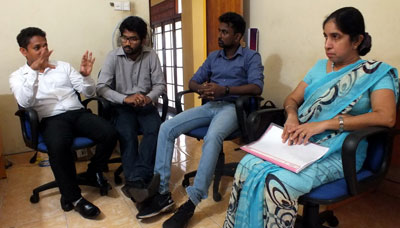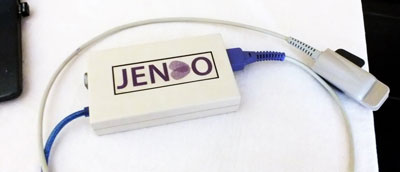Sri Lankan team in early major breakthrough on early detection of NCDs
Three young graduates from the Moratuwa University along with a medical practitioner have made a major breakthrough in the medical world where their invention helps in early detection of non-communicable diseases; heart attacks, diabetes and chronic kidney disease (CKD), the main of deaths in the world.

The trio: Kirthi Kodithuwakku (first from left) explains the operation of ‘Jendo’. Others in the picture (second from left are, Isuru Rajakaruna, Charith Vithanage and Ms. D.N. Wickramarachchi.
The trio – Kirthi Kodithuwakku, Isuru Rajakaruna and Charith Vithanage – while as undergraduates initiated their research and in 2015 as individuals secured a grant from the National Science Foundation (NSF) to further their research. Prof. Saroj Jayasinghe, University of Colombo and a consultant physician, National hospital, heads the team.
The team operates from 7B/2, Church Rd, Wewala, Piliyandala and Business Times (BT) team recently accompanied Ms. D.N. Wickramarachchi, Senior Scientific Officer, NSF to their office last week to obtain more details of this unique achievement.
The invention is called ‘non-invasive technology to detect risk of having vascular diseases,’ which would become handy for medical practitioners in detecting the critical stages of such diseases. ‘Jendo,’ a Sri Lankan product, could bring in huge foreign income as a high value export that would strengthen the economy and gain a reputation to Sri Lanka as being at the forefront of biomedical engineering in the world.
Mr. Kodithuwakku explained that cardiovascular diseases are the number one cause of death in the world and quoting the WHO, said it covers more than 30 per cent of the global deaths. However, more than 50 per cent of patients could be saved by early detection and treatment.
Most of the sufferers are ‘middle-aged resulting in a huge burden to any country, and he emphasized that with the new technology this global problem can be solved by detecting vascular abnormalities and aiding the diagnosis of these diseases at the early stage.
Once the team developed the product they floated a corporate entity by the name and style of Jendo Innovation (Pvt) Ltd. Mr. Rajakaruna said that their product is an affordable alternative (around US$3 or in the range of Rs. 400) to detect the risk of cardiovascular diseases early allowing timely medical attention and unnecessary expenditure.
Mr. Kodithuwakku said that they gained ethical clearance from the Faculty of Medicine, University of Colombo, to conduct clinical trials in 2016 and since then, the device has been tested with over 1000 patients and non-patients at the National Hospital of Sri Lanka, showing 85 per cent sensitivity in early detection of cardiovascular diseases.
Patents
With these positive results, he said that they have filed patents in Sri Lanka and the International Patent System or the Patent Cooperation Treaty (PCT) that assists applicants in seeking patent protection internationally that covers more than 130 countries. Then Jendo moved to the start-up ecosystem becoming the best start-up in JohnKeellsX Innovations challenge 2016 and best start-up in Seedstar Colombo 2017. Internationally, Jendo was listed among top 10 innovations at the Cambridge Innovation Forum and represented Sri Lanka at the Seedstar Global event in Switzerland.

Sensor connector clipped to the index fingure
Several well-established medical institutions have offered to invest in the company and one of them has now partnered with Jendo with a huge investment to strengthen its research studies and currently they are in the process of raising another round of funding and opening up to commercialisation.
Mr. Kodithuwakku asserted that while Jendo could be a life saver, it is now focused on becoming a ‘unicorn company’ one day so that it can bring glory to Sri Lanka.
The serious stages of dengue and chronic kidney disease (CKD) in the country compelled the trio to venture into this research and then visualized the potential in detecting cardio-vascular related diseases, he stressed.
He said that eventually they found that the pace of these abnormalities is connected to one point which is endothelial dysfunction. Actually endothelium is the innermost layer of the blood vessels which regulates many vascular functions.
He pointed out, “when a cardio vascular disease is in the body this is where the first changes are happening. That is why it is very important for doctors to detect the endothelial dysfunction to get an idea about a patient’s risk profile. With this what we can do is to exactly tell whether there is a physical damage in the body, in the blood vessels.”
The potential products and technologies that are planned in the next phase are devices that can be used in post-surgery care of patients with varicose veins, in order to monitor blood flow to affected areas. This is vital to avoid complications that can arise from poor blood supply.
“This is like the Ayurvedic naadi (pulse) sasthraya. Ayurveda Vedamahaththaya, can listen to the pulse beating pattern as they have trained their brains to identify if there is an abnormality. Basically, what we have invented is something similar to that and by having those parameters from the body the machine will be able to do that kind of thing,” he added.

The ‘Jendo’ hardware device that is clipped to the patient and to the computer
He said that endothelial dysfunction is available in the medical domain as every doctor knows that it is the first stage of any cardio vascular disease, but nobody has put a sensor into this to train this kind of system. However, an Israel company and a Russian company have done a similar thing.
Yet, he asserted that their technology is different, unique and patentable. He said that the potential of their product is great and once PCT is granted, “that means that this kind of device is not available anywhere in the world and once the process is approved we can go to the world.”
He said that now they have gone to the US and at the moment one party is willing to get it in the US and likewise, Japan, Spain, France and several other countries are willing to get their product in these countries.
In Sri Lanka, Jendo targets the entire lab network and the hospital network as a starting point because every doctor can get a huge benefit by having this test. In the world also, it would be a life saver. As a market potential they could take WHO statistics as more than 40 per cent of the people have some sort of cardiovascular disease. So assuming 20 per cent can afford this service, more than 2.5 billion people would use this to monitor their health.


